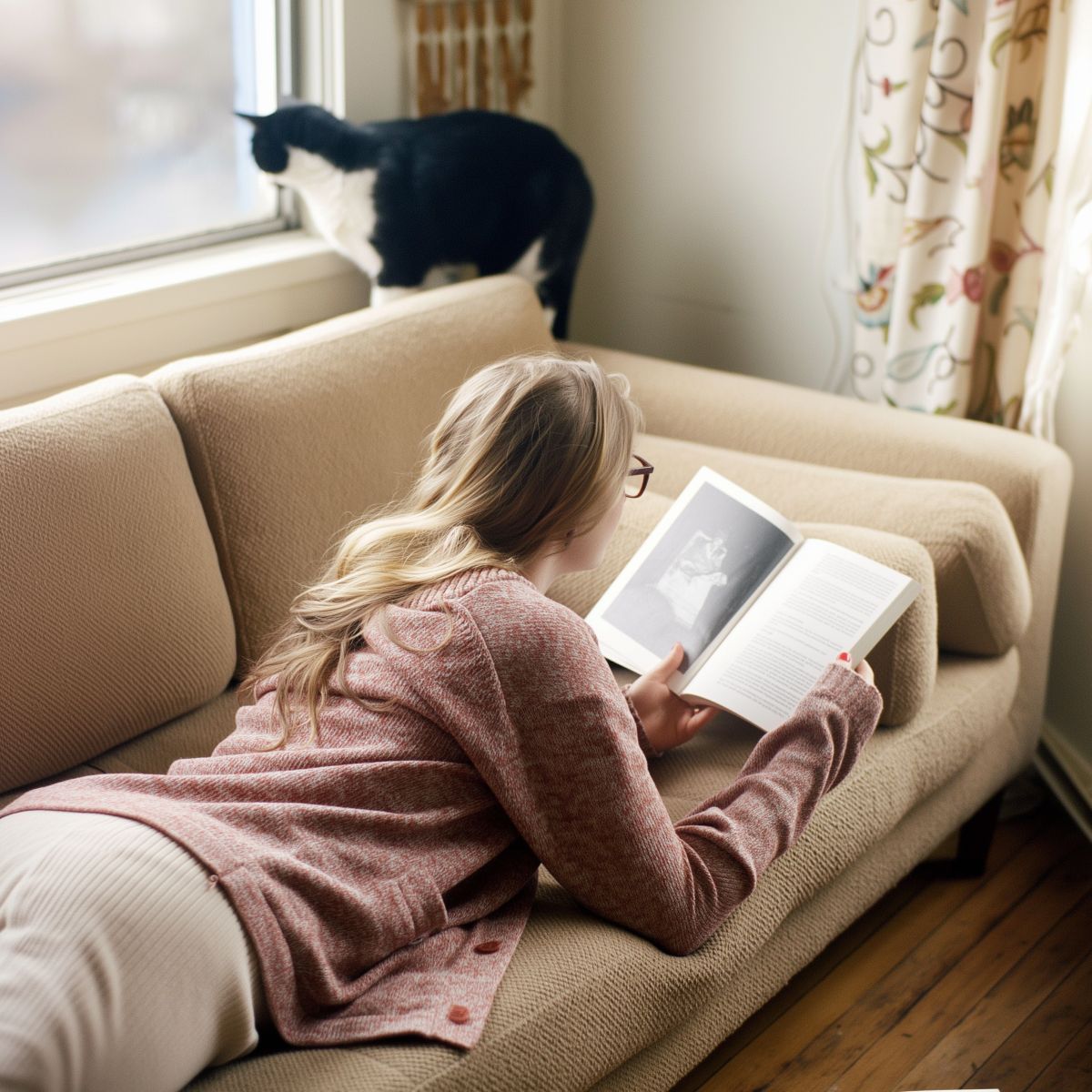
Moon Conjunct Mercury Natal Aspect
 When you have the Moon conjunct Mercury, your thoughts shift with the emotional landscape of your inner world. You feel your thoughts, and your words carry the weight of that sensation. It makes you deeply empathetic, able to translate emotion into language in a way others struggle to articulate. You give voice to the silent tides of the heart. This can be the contact of the storyteller, the translator of emotions, the one who takes the invisible and makes it known. This aspect is linked to gossip, but not always the petty, behind-the-curtain kind. This is the necessary act of weaving meaning through words. You don’t chat idly; you transmit feeling through thought and thought through feeling. Your words soothe, stir, shape reality itself. You have a lyrical dialogue. In some charts, people speak merely to talk about others, but you can just as easily discuss ideas with the same passion that others reserve for scandal. You may prefer to spread the news of the soul’s inner workings. You could be the person who turns everyday conversations into something meaningful, who translates life into something deeply insightful.
When you have the Moon conjunct Mercury, your thoughts shift with the emotional landscape of your inner world. You feel your thoughts, and your words carry the weight of that sensation. It makes you deeply empathetic, able to translate emotion into language in a way others struggle to articulate. You give voice to the silent tides of the heart. This can be the contact of the storyteller, the translator of emotions, the one who takes the invisible and makes it known. This aspect is linked to gossip, but not always the petty, behind-the-curtain kind. This is the necessary act of weaving meaning through words. You don’t chat idly; you transmit feeling through thought and thought through feeling. Your words soothe, stir, shape reality itself. You have a lyrical dialogue. In some charts, people speak merely to talk about others, but you can just as easily discuss ideas with the same passion that others reserve for scandal. You may prefer to spread the news of the soul’s inner workings. You could be the person who turns everyday conversations into something meaningful, who translates life into something deeply insightful.
With this aspect, you might find yourself speaking from the gut. Your emotions demand expression, and likely, you process life by talking about it. But there’s a trickster quality here, too. Mercury is a messenger, and the Moon is ever-changing—so your mind is a shape-shifter, adapting, flowing, dancing between different perspectives. Be mindful that you don’t get lost in your own fluctuating perceptions, mistaking the movement of thought for the solidity of truth.
Mood Swings & Mind Things
This is not the cold, analytical Mercury of the textbook communicator, nor the detached Moon of a distant dreamer. This is thought wrapped in feeling, feeling expressed as thought—a beautiful, inseparable fusion of intellect and emotion. You feel your thoughts. You think your emotions. It’s like living in a house where the walls are made of words, the furniture is made of feelings, and everything is filled with meaning. Astrologers claim that individuals with this aspect are naturally clever. You are, of course, intelligent—but not in a detached way. Your intelligence is alive, breathing, shifting with the tides of your inner world. You understand people not because you analyze them from a distance, but because you feel your way into their experiences.
The Moon conjunct Mercury is the born chronicler of the soul’s ebb and flow. Your mind is a feeling entity, a restless tide of thoughts and emotions that must find form, must be put into words, must be shared. Journals, notebooks, scribbled musings on the back of receipts—these are your survival. You document life, shape it into meaning through the written or spoken word. Thoughts don’t sit still inside you; they demand expression. And what a beautiful need that is. Some people store their emotions in silence, let them fester, let them go unnamed. But you? You translate feeling into language. You make the inner world knowable, not only for yourself, but for others who may not have the words for what they feel.
Your mind is too active, too fluid, too engaged with life to be bottled up. Thoughts must be shared, feelings must be translated, ideas must be expressed—or else they swirl endlessly within, restless and unspoken. There is a deep need here, a compulsion almost, to make sure what you know inside is understood outside.
But beware: the Moon is ever-changing, and Mercury is quicksilver. The moods shift, the thoughts race—sometimes clarity is hard to pin down. One moment, you know what you feel, the next, a new thought rewrites the whole thing. That’s the beauty and the challenge of this conjunction—your inner world is a dynamic, living conversation, never static, never dull. Use it well. Be the writer, the gossiper, the one who speaks truth wrapped in feeling. Give voice to the inner world, make emotions known, let thoughts breathe. And if you must overthink, at least do it beautifully.
The Thought Collector
You don’t passively observe people; you absorb them. You sense their inner workings, not in a detached, analytical way, but in an embodied, empathetic one. You feel your way into their thoughts, picking up on the subtleties, the unspoken nuances. It’s a connection, an innate desire to understand what makes people tick, to peer into their inner landscapes and map them out in words. You process feelings like ideas, analyzing them, sorting them, giving them names and stories. But in return, your thoughts are never purely logical—they carry the weight of feeling, the depth of lived experience.
This is what makes you insightful, compassionate, and deeply expressive. But be mindful—sometimes, in trying to analyze emotions, you may intellectualize what should simply be felt. Not everything needs to be understood to be real. Some feelings just are. You can act as the bridge between thought and emotion, the one who understands not only with the mind, but with the heart.
Your mind and heart coalesce, blending into one seamless, fluid stream of thought-feeling, feeling-thought. You think in sensations, in moods, in waves of emotion that carry intellectual meaning. Likewise, you narrate, you name, you analyze, you express. It’s an endless dance of absorption. When you come across ideas—you drink them in, digest them, embed them into your inner world. Communication is a need. Language is where you feel most at home, words are where you root yourself. Talking, writing, sharing—these are nourishment. The mind must always be engaged, the emotional world must always be given form through thought.
This is why imagination flourishes here—because you don’t merely process life, you turn experience into meaning. You can take the most momentary feeling and give it language, shaping it into something that can be understood, explored, shared. This makes you a natural writer, speaker, blogger—someone who translates the hidden currents of life into something more
If this conjunction is in the same sign? Double perception. You have the ability to see both the intellectual and emotional dimensions of experience simultaneously, with understanding and depth. Your mind and heart harmonize effortlessly. What you feel, you think. What you think, you feel. There is no inner divide. But remember—this intensity of thought and emotion can be both a gift and a challenge. A restless mind, a deep sensitivity, a tendency to overanalyze feelings instead of simply allowing them. Be kind to yourself. Let some thoughts drift without being dissected. Let some emotions exist without needing to be explained. And most importantly—keep expressing. Keep sharing. Your gift is not just in thinking or feeling, but in bringing them together to make sense of the world, for yourself and for others.
Thoughts with a Side of Feelings
You’re not only interested in what people say, but why they say it, what’s underneath, what lingers unspoken between the lines. This makes you a natural at anything that involves deep communication—counseling, psychology, teaching, writing, storytelling. The role of the interpreter suits you well, not simply in a linguistic sense, but as someone who translates the hidden depths of human experience into words that others can grasp.
There’s wit here, too—mercurial, playful, sharp. You play with words, bending and shaping them with ease. You may love learning in all forms, craving mental stimulation like oxygen, drawn to knowledge that feeds both the intellect and the imagination.
There’s a quickness here, a cleverness that isn’t forced but innate—a natural, mercurial ability to adapt your thoughts and expressions like shifting tides. You crave learning in all of its forms. A stagnant mind is unbearable—you need movement, discovery, the thrill of new ideas. Whether through books, conversations, writing, or observation, you’re always gathering, absorbing, taking what you know and turning it into something richer. But it’s not cold knowledge that intrigues you—it’s the kind that sparks imagination, that makes the world more alive, more meaningful. It makes you a captivating conversationalist, an insightful speaker, a curious explorer of ideas. You may find yourself drawn to the subtle art of decoding human nature through the way people speak. You interpret, you illuminate, you connect.
Thinking, Feeling, Spilling
Traditional astrology says that a man with this aspect attracts an intelligent, talkative, youthful wife. And a woman with this aspect is those things. What this really speaks to is a magnetic connection to intelligence, to lively minds, to people who think and feel with the same fluidity as you do.
It points to a deep, almost instinctive magnetism toward minds that are alive, quick, expressive. Whether in friendships, love, or creative partnerships, you’re drawn to those who think and feel with the same fluidity you do—people who can keep up, who can dance in the rhythm of rapid conversation, who can switch from discussing something deep to laughing at something utterly ridiculous in the blink of an eye. This is an aspect that thrives on connection—not only physical attraction or shared interests, but mental and emotional resonance. You’re not looking for someone to simply be with; you’re looking for someone to think with, to wonder with, to explore the world of ideas and emotions as deeply as you do. Stale, surface-level connections won’t do—you need someone who makes words and ideas feel alive. So, whether you are this bright, mercurial presence or you seek it in others, one thing is clear—your world is shaped by the exchange of thoughts and feelings. Find those who speak your language, whose minds light up with possibility, and your life will never be dull.
The one caution? Neither the Moon nor Mercury are known for stability. Feelings shift, thoughts race, perspectives change like the tides. One moment, you know what you feel; the next, a new idea reshapes the whole picture. It’s a beautiful, ever-evolving way to exist, but grounding is key.
Notepad Confessions
The Moon conjunct Mercury is a mind soaked in feeling. You absorb the world, its impressions sink into you like ink on paper. Logic isn’t separate from emotion—it’s colored by it, shaped by it, given life through it. This gives you an ability to take in information effortlessly, like a sponge drawing in water. But not cold facts—impressions, subtleties, the emotional undercurrents beneath what is said. The Moon remembers, Mercury articulates—so what touches your emotions, you will express, sometimes without even meaning to.
Your speech, your writing, your thoughts—they aren’t sterile or detached. They carry the warmth of lived experience, the weight of emotional understanding. You don’t state facts; you interpret them, infusing them with meaning, with depth. You not only communicate what is happening; you give voice to how it feels. And this isn’t reserved for big topical debates—it’s daily, ordinary, human. At the same time, this aspect makes you a bridge—able to speak about things that others feel but struggle to articulate. You might find yourself saying something and watching as someone else’s eyes widen in recognition, because you’ve just given words to an emotion they hadn’t yet understood themselves.
But with such receptivity comes a challenge—you must be mindful of whose emotions you’re taking in, whose thoughts you’re carrying. The Moon retains, and Mercury expresses, but what you absorb must be yours, not just a collection of the feelings swirling around you.
You can become a mirror for everyone else’s thoughts and feelings, reflecting them back. Like the Moon itself, which holds the light of the Sun but does not generate its own, you must ask yourself: Am I thinking my own thoughts, or am I echoing what I’ve absorbed? Am I feeling my emotions, or have I unknowingly taken on someone else’s? The challenge is not to shut off this sensitivity—that would be like asking the tides not to move. Instead, it’s about awareness. What belongs to you? What resonates with your truth? When you speak, when you write, when you share—does it come from a deep place within, or is it a patchwork of external impressions? Journaling can help, as can moments of stillness—letting thoughts settle. And when you do express, do so with intention. The Moon retains, Mercury articulates—so let what you share be a reflection of your inner world, not just the waves you’ve been swimming in. Because when your voice is truly yours, it holds a rare and beautiful power—the ability to give language to emotions others struggle to name. A mind that feels and a heart that thinks—when balanced, it’s an extraordinary force.
Mental Notes & Emotional Quotes
You don’t need people to explain themselves in detail; you intuit their inner world as if you’ve slipped inside their skin, reading between the lines of what’s said and—more importantly—what isn’t said. This gives you a kind of everyday wisdom, the ability to offer practical, heartfelt advice that actually makes sense. Not the lofty, theoretical kind, but the grounded, human kind—the kind that touches people, makes them feel understood, helps them understand the messiness of life with a little more clarity.
And where does this common sense come from? Memory (Moon). Not pure factual memory, but emotional memory. Every experience, every feeling, every past interaction is stored inside you, shaping your perceptions. This is why you often just know what’s needed in a given situation—because your mind is constantly cross-referencing the present moment with everything you’ve felt and understood before.
But here’s the hard part—sometimes, emotions don’t only inform thinking, they distort it. When feeling and thought are so intertwined, bias can slip in unnoticed. A past emotional wound might color your perception of a present situation. What feels true in the moment may not actually be true. The challenge? Learning to recognize when emotions are guiding you wisely and when they’re leading you astray.
And then, of course, there’s the love of discussion. Talking, thinking, analyzing, processing—it never really stops, does it? Conversations aren’t just casual exchanges; they’re how you understand the world, how you digest your emotions, how you connect. Whether through deep discussions or endless internal musings, you need this dialogue, this mental movement.
Talking isn’t only sharing ideas—it’s thinking out loud. It’s taking what’s swirling inside you and externalizing it, shaping it into something. It’s why silence for too long can feel stifling—thoughts pile up, emotions get tangled, and without an outlet, they turn into an endless loop in your head. You love discussions. Not only the intellectual kind, but the kind that moves something in you—conversations that make you feel, that make you wonder, that open doors in the mind you didn’t even know were there. Whether it’s dissecting a film, analyzing human nature, or simply unraveling the meaning behind a passing feeling. Dialogue is your lifeblood, your bridge to understanding both yourself and others.
Conversations I Had with Myself
A day in the life of a Moon-Mercury conjurer is often a whirlwind of words, thoughts, feelings, and endless mental movement. You wake up, and before your feet even hit the floor, your mind is already racing. Maybe a dream lingers, something symbolic, something that means something, and you instinctively start analyzing it. What was your subconscious trying to tell you?
Then, the phone—notifications, messages, emails. A quick scroll, a reply here, a shared article there. A headline catches your eye, and suddenly, you’re deep in a research spiral, following links, reading perspectives, absorbing new information like a sponge. Breakfast might be eaten absentmindedly while your brain is already in full gear, consuming words like fuel.
Work, of course, involves more communication. Maybe it’s writing—emails, reports, articles, social media posts. Maybe it’s conversation—calls, meetings, brainstorming sessions where you bounce ideas around, shaping and reshaping them in real time. The day is punctuated by quick chats, a bit of friendly gossip (nothing petty, just the exchange of information, of course!), and moments of deep discussion where you feel truly alive.
Somewhere in the middle of it all, you’re jotting down ideas in a notebook—something you overheard, a thought that struck you, a phrase that just felt right. Maybe it’s for a personal project, a journal entry, or just a place to store the endless stream of observations flowing through your mind. Lunch is accompanied by reading—an article, a book, a podcast in the background. Why waste time doing just one thing when you could be learning? Information is essential, and your mind craves it like your body craves food.
By evening, a conversation with a friend turns into something deeper—an exchange of ideas, feelings, musings on life. You analyze, interpret, reflect. Maybe you write a long message or post about something that’s been on your mind, shaping thoughts into words, giving form to emotions that were swirling inside. And before bed, one last dive into a book, a final scroll through something thought-provoking, a moment of reflection. The mind should rest, but let’s be honest—it probably won’t. Thoughts will still move about, feelings will still stir. Tomorrow, it all begins again—a new day of words, ideas, and the never-ending, beautiful cycle of thinking and feeling.
Lunar Logic & Mercurial Madness
Nothing is truly mundane in your personal world, it’s a thought, an observation waiting to be explored. You narrate daily life, analyze it, give it meaning. The way the neighbor waters their plants at odd hours? Interesting. The subtle change in topics of your favorite website? Noted. An emotion passing through you while washing the dishes? Worth writing about.
Your conversations often center around the things most people overlook—family happenings, small interactions, subtle shifts in the emotional atmosphere of your day. Not because you’re obsessed with triviality, but because you see the depth in it. Daily life isn’t something to get through; it’s full of rich feelings, experiences, and stories waiting to be told.
Your moods shape your opinions, your viewpoints, your focus. One moment, you feel something deeply, and it colors your perspective. The next day, a different emotional undercurrent runs through you, and suddenly, the world looks different. Some may call this inconsistency, but really, it’s just fluidity—you are moved by life, responsive to its waves, open to changing your mind as new feelings arise.
You’re always chronicling life. It’s a necessity. A way to process, to understand, to retain the countless impressions that move through you each day. Maybe it’s a journal entry about a passing thought, a quick note on something intriguing you overheard, a long inner dialogue unpacking your feelings. You record because your mind is too full to hold everything in. You have a way of capturing the undercurrents, the emotional truth behind things. So keep observing, keep writing, keep letting the everyday world fascinate you. Because in your eyes, in your words, the ordinary becomes extraordinary.









 Venus-Pluto Synastry: A Love So Powerful That It Might Just Kill Them
Venus-Pluto Synastry: A Love So Powerful That It Might Just Kill Them
 Venus-Pluto Aspects: Ruin Me
Venus-Pluto Aspects: Ruin Me
 Sun Square Pluto Synastry: You’ve Got That Power Over Me
Sun Square Pluto Synastry: You’ve Got That Power Over Me
 The Difference: Progressions Vs Transits
The Difference: Progressions Vs Transits
 Moon Conjunct Pluto Synastry
Moon Conjunct Pluto Synastry
 The Twin Journeys of Saturn’s Returns
The Twin Journeys of Saturn’s Returns
 Mars in Aquarius: Sex drive
Mars in Aquarius: Sex drive
 Mars-Pluto Synastry: Something Quite Dark and Dangerous
Mars-Pluto Synastry: Something Quite Dark and Dangerous
 Mars Square Pluto Natal Aspect: The Unbreakable Spirit
Mars Square Pluto Natal Aspect: The Unbreakable Spirit
 Venus Trine Pluto: Dark Desires
Venus Trine Pluto: Dark Desires
 Uranus Transits the 6th House
Uranus Transits the 6th House
 Uranus Transits the 4th House: The Chaotic Path to Personal Inner Growth
Uranus Transits the 4th House: The Chaotic Path to Personal Inner Growth
 Emotional Understanding: Moon Trine Synastry Aspects Interpreted
Emotional Understanding: Moon Trine Synastry Aspects Interpreted
 Reflections on a Past Venus-Pluto Synastry Aspect
Reflections on a Past Venus-Pluto Synastry Aspect
 Sun Opposite Pluto Natal Aspect
Sun Opposite Pluto Natal Aspect
 The Cost of Living Through the Eyes of Aries to Virgo
The Cost of Living Through the Eyes of Aries to Virgo
 Pluto in the 8th House: Secrets of the Soul
Pluto in the 8th House: Secrets of the Soul
 Mars Conjunct Pluto Synastry
Mars Conjunct Pluto Synastry
 Composite Sun in the 8th House: Weather the Storm
Composite Sun in the 8th House: Weather the Storm
 Venus Trine Mars Synastry
Venus Trine Mars Synastry